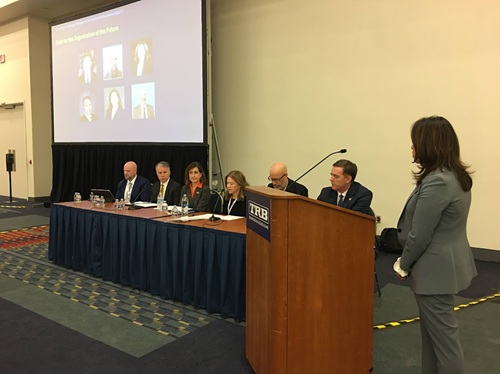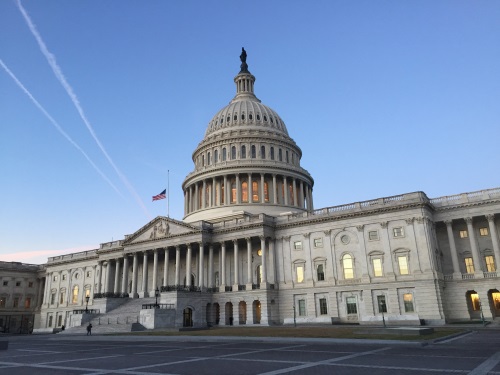Implementation of the $1.2 trillion Infrastructure Investment and Jobs Act or IIJA, enacted in November 2021, remains a critical focal point for Congress, according to key transportation committee leaders within the Senate and House of Representatives.
[Above photo by AASHTO]
Speaking at the American Association of State Highway and Transportation Officials 2023 Washington Briefing –held February 28 through March 3 at the Hilton Washington D.C. Capitol Hill hotel – those leaders emphasized that providing states with the flexibility to use IIJA funding to address their particular mobility needs is their main priority.

“We know the needs and desires of governors and state legislatures are often different from federal government – that’s why we need to give you that flexibility, as long as you stay within the guardrails of the IIJA,” said Sen. Shelley Moore Capito (R-WV), ranking member of the Senate Environment and Public Works committee. “We need to give you enough ‘berm’ to make decisions.”
Sen. Capito said she remained “very proud of IIJA” as she knew there was a “sweet spot” regarding the nation’s infrastructure needs.
“It is a subject we are all passionate about and is something we all need,” she added. “Now we are looking at the permitting process for [infrastructure] projects, as that has been made difficult in some areas; not so much in the road [construction] space but for energy and electric grid projects. We need permitting reform or we’ll never get projects in those sectors done.”
[View Sen. Capito’s remarks in the video below]
Sen. Tom Carper (D-DE), who chairs EPW committee, emphasized in his remarks that the trade needs of the country are another reason why states need IIJA funding flexibility.
“Most of what we make in this country, we sell outside of this country,” he said. “That is why transportation matters to trade. You need trucks, you need ports, and roads to move it. As good as we like to think our roads are, we can do better.”
[View Sen. Carper’s remarks in the video below]
Rep. Rick Larsen (D-WA), the ranking member on the House of Representatives Transportation and Infrastructure committee, added that states should provide frequent updates to their congressional representatives regarding their IIJA implementation efforts.

“The [IIJA] is not a ‘set it and forget it’ law – we have four years left on it and a lot of money and decisions about those dollars have yet to be made,” he pointed out. “You should use [IIJA] projects as an opportunity to highlight transportation investments in your states and I encourage all of you to update your congressional delegations about the progress you are making on [IIJA] implementation. Because if you want another five year [reauthorization] bill, you need to show your congressional delegation right now how that money is working.”
Rep. Larsen also pointed out that states are some of the “most important stakeholders” in the success of IIJA implementation and in building better transportation solutions for the future, though that process will not happen overnight.
“It is incumbent upon us all that we recognize and confront that challenges that our current transportation system can create, and both AASHTO and its members can help us do that,” Rep. Larsen said. “We have a lot of infrastructure needs in country, so we have to work together so we build better communities and provide a better quality of life for our fellow citizens.”
[View Rep. Larsen’s remarks in the video below]
And meeting those disparate needs, stressed Rep. Rick Crawford (R-AR) – who chairs the House T&I Subcommittee on Highways and Transit – is why states need maximum flexibility when it comes to IIJA implementation.

“My philosophy is that while we ask an awful lot of you, our states, when it comes to transportation, we don’t necessarily properly equip states to do that work,” he explained.
“We need to give states much more flexibility. Not every state has every tool in the [transportation] toolbox to work with. They need them in order to drive investment in areas they think are important,” he added.
[View Rep. Crawford’s remarks in the video below]
That’s also why Rep. Crawford said he remains a strong advocate of the “One Federal Decision” policy, which would help speed up a variety of infrastructure projects.
“I cannot say enough about how important that is, for the additional cost and time savings ‘One Federal Decision’ offers goes an awful long way to expedite projects,” he said. “It is really important to recognize any opportunities to make common sense [regulatory] changes that would streamline projects for everyone.”
 Top Stories
Top Stories
AASHTO Lays Out Policy Action Agenda for 2026
February 6, 2026 Top Stories
Top Stories

